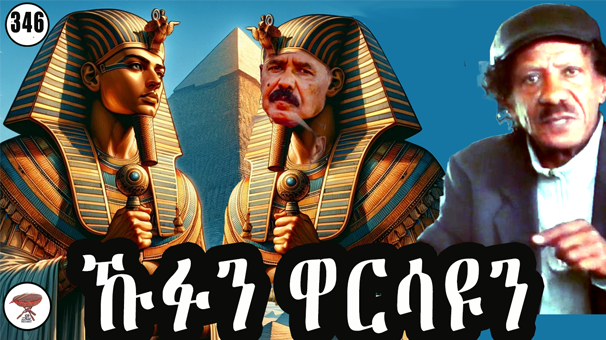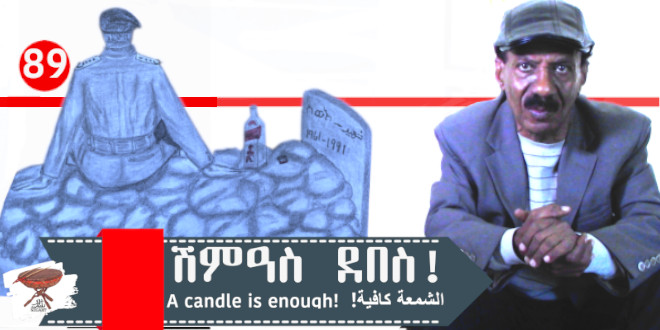The Faucet Festival
Maybe the story behind Isaias’ faucet is innocent. Perhaps a student sculpted a rock from clay and placed a faucet in the middle of it. Maybe it was a gift, or maybe Isaias himself requested it as decoration for his Adi Halo retreat. It could even be that he wanted to encourage young artists. Or maybe it’s none of those things.
Khufu’s pyramid and Isaias’ Faucet
When I first saw the photo of Isaias standing in deep contemplation before the faucet, I exclaimed: “What a great achievement, what a marvel of economic advancement!” In my imagination, he instantly transformed into Pharaoh Khufu inspecting the Great Pyramid of Giza at its completion.
Khufu’s pyramid, built 4,600 years ago, took 20 years of human labor to complete. Its inauguration must have been a celebration befitting the glory of a pharaoh. The pyramid—well, in this case, the faucet.
To appreciate the magnificence of the pyramid, you must stand before it, dwarfed by its sheer mass, with the Sphinx guarding it. Inside, deep within the stone passageways, lies a granite sarcophagus where Khufu’s body was once placed. But his mummy vanished long before modern times. The lower chambers were repeatedly looted; each intruder found treasures—jewels, gold, statues—until eventually Western museums displayed them after 19th-century archaeologists and treasure hunters stripped the tombs bare.
So when I saw Isaias inspecting the faucet, I imagined him as a reincarnated Khufu—standing unamused before his empty sarcophagus. If he returns 4,000 years from now, will he be equally unamused? Why not? Pharaohs always return. He might even find the faucet dripping, just like in the comedy of the legendary Syrian performer Qawar Al-Toshe (a clip is still circulating on YouTube.)
https://www.youtube.com/watch?v=61u6CzBneZk
Just as Khufu’s pyramid was meant as a monument to permanence, perhaps the faucet too is meant to immortalize its patron.
The Syrian Comedy
The Syrian sketch “Faucet Festival” (by the famous comedian Duraid Lahham, known as Qewar AlToshe) tells the story of villagers who built a state-funded faucet. Once installed, they threw a festival—dancing, singing, celebrating their achievement. But afterward, they demanded compensation for the costs of the festival.
A rigid legal advisor refused. The people argued, “The faucet was funded, but the festival was not, we danced, sang and sweated.” The advisor still refused.
The escalated the case; a corrupt director overruled the advisor and agreed to pay. The advisor resisted, refusing to release the money, and eventually resigned due to pressure and in protest. At home, his wife and daughter were surprised: why are you here during working hours! He told his wife he resigned and that he was sure his superiors would surely come to persuade him to withdraw his resignation. He waited. And waited. But no one came. He was not as indispensable as he thought he was.
That was Syria’s faucet. Eritrea’s faucet looks different. Here, conscripts work for free, building houses for their commanders, tending to their farms, digging endless ditches, erecting stages for festivals, and dismantling them again—all without pay. And unlike the Syrian villagers, they cannot even entertain the idea to ask for compensation. If they do, they risk vanishing into prisons no one speaks of.
Some will protest: “But Eritrean officials are not corrupt.” Maybe, maybe not. But how could you know, when the state monopolizes information? Even when genuine criminals are jailed, no announcement is made. Victims vanish, and you are told not to ask about them. You must not mention political prisoners. You must act as if the truth you witness never happened.
And so, unlike the Syrian comedy, Eritrea’s faucet festival has no punchline. Only silence.
The Russian Dolls
Don’t misunderstand: the artist who created Isaias’ faucet was honored—personally—by the president at Adi Halo. But honors cannot disguise the deeper symbolism.
My advice to Kbur Brezidenti: leave a will that your valuables be buried beneath the faucet, along with a granite sarcophagus and who should replace you. For even pharaohs pass away.
كُلُّ مَنْ عَلَيْهَا فَانٍ
وَيَبْقَى وَجْهُ رَبِّكَ ذُو الْجَلالِ وَالإِكْرَامِ
“Everything on earth is perishable; only the glorious and almighty God remains forever.”
Khufu’s followers sacrificed animals in his memory. Your followers already gave enough—blood, labor, devotion. They even designed you a faucet. No one printed Khufu’s face on T-shirts. Yet your cult has gone beyond the ancients.
Like the Great Pyramid, the faucet was meant to be an everlasting memorial of its owner’s place in society, and symbol of his power. Here’s an excerpt from an advice by Djedefre, Khufu’s son, to his father:
Make your grave well furnished and prepare your place in the west.
Look, death counts little for us. Look, life is valued highly by us.
The house of the dead (the tomb) is for life.
And yet, sometimes I think less of pyramids and more of Russian dolls. Each doll hides another within, and another within that—layer after layer. You, Kbur Brezidenti, placed our freedom in the smallest doll and sealed it inside countless shells. We peel and peel but never find the real freedom.
What if there is no final doll? What if, like Khufu’s missing remains, the true “freedom doll” was destroyed long ago—burned or buried where no one can find it?
Perhaps that is why your cult insists you are the embodiment of freedom. If you are present, the nation is free. Without you, it is not.
Pharaohs were invincible. They were gods in human form. No one dared disobey them. Likewise, your cult will never revolt against you. To them, you are not merely a ruler—you are mightier than Khufu himself.
No one revolted against the pharaohs. They were invincible. They were considered gods in human form. No one disobeyed them. Likewise, your cult will not disobey you either. To them, you are mightier than Khufu, a reincarnation of the pharaoh, 4,600 years later.
Who says the age of the pharaohs is over? We are their reincarnation. And we have a pharaoh to prove it.





Awate Forum